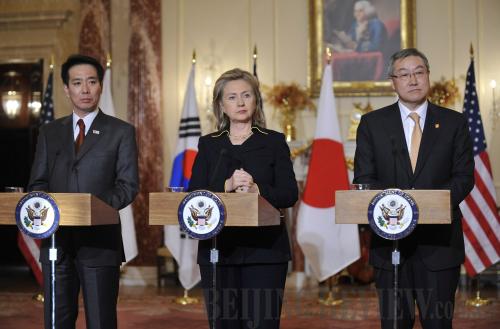|
 |
|
BOLSTERED ALLIANCE: U.S. Secretary of State Hillary Clinton, South Korean Foreign Minister Kim Sung Hwan (right) and Japanese Foreign Minister Seiji Maehara attend a press conference after their trilateral meeting in Washington, D.C. on December 6 (ZHANG JUN) |
Military measures will not help to reach a solution to disputes on the Korean Peninsula, and will only make the situation worse. All related parties, especially the United States, should exercise restraint and advocate six-party talks, analysts said.
It is unlikely military threats from the United States, Japan and South Korea will force North Korea to surrender, said Shi Yuanhua, Director of the Center for Korean Studies at Fudan University in Shanghai. Only a soft-landing tactic, like an emergency session of the suspended six-party talks, can solve the problem effectively.
China, North Korea, South Korea, Japan, Russia and the United States initially started the six-party talks in 2003 to address security concerns resulting from North Korea's nuclear weapons program. The talks were discontinued in 2009.
Tensions on the Korean Peninsula spiked after a recent exchange of fire. On November 23, a North Korean shelling of the Yeonpyeong Island, home to more than 1,000 South Koreans, killed two marines and two civilians. Pyongyang claimed its attack was prompted when, during a scheduled naval exercise, Seoul's shells fell on the northern side of a disputed maritime border.
Soon after, the United States held large-scale naval drills with South Korea and Japan, separately, in waters near the peninsula.
A trilateral alliance
"It seems that a trilateral military alliance is being institutionalized between the United States, Japan and South Korea," said Chen Xiangyang, an associate research fellow with the China Institutes of Contemporary International Relations.
In the recent U.S.-Japan joint military exercise, for the first time, South Korea attended as an observer. And Japan was invited to watch the U.S.-South Korea exercise in July.
The strengthening of the U.S.-Japan-South Korea military alliance reflects a change in the United States' Asia Pacific strategy. The focus has shifted from bilateral alliances to a multilateral framework, featuring sub-regional security mechanisms, Chen said.
The increasing scope of these alliances is conducive to a U.S. domination of the Asia Pacific security pattern, added Chen.
Two days after a joint naval exercise with South Korea ended on December 1, the United States began an even larger week-long exercise with Japan.
Altogether more than 40,000 soldiers participated in the U.S.-Japan military exercise, which was the largest ever between the two nations and was estimated to be six times bigger than the U.S.-South Korea exercise.
In 2010, the United States conducted a total of five military exercises with South Korea and two with Japan. These exercises strengthened the U.S.-South Korea and U.S.-Japan military alliances and indirectly consolidated the triangular military relations of the three countries.
Then the three countries held a trilateral meeting among their chief diplomats in Washington, D.C. on December 6 in order to coordinate their positions on Korean Peninsula issues. The meeting illustrates a further strengthening of both military and political ties among the three countries.
A joint statement issued after the meeting said the three countries "reaffirmed their mutual bilateral responsibilities and steadfast commitments under U.S.-South Korean and U.S.-Japanese security treaties, which serve as foundations for the two alliance relationships."
The three chief diplomats also pledged to maintain and enhance coordination and consultation on Korean Peninsula issues, the statement added.
| 